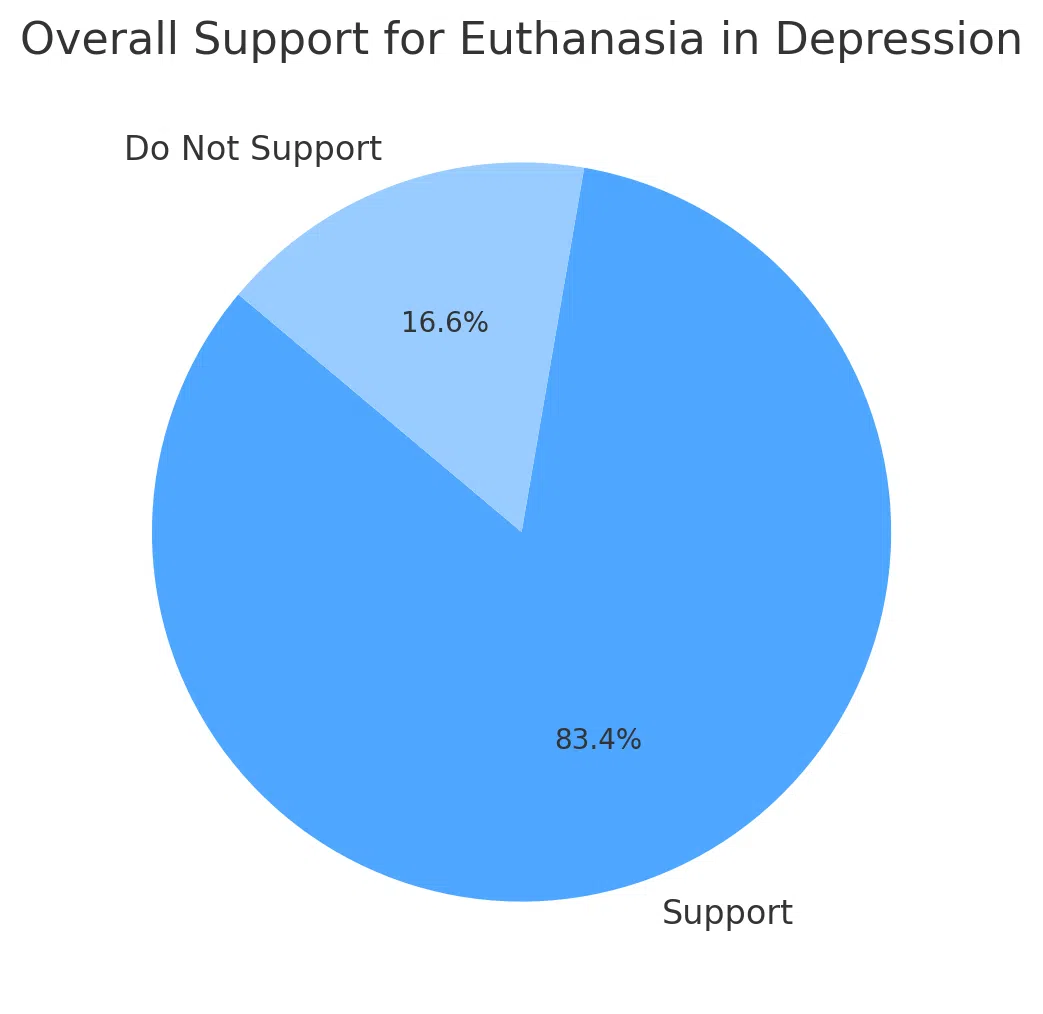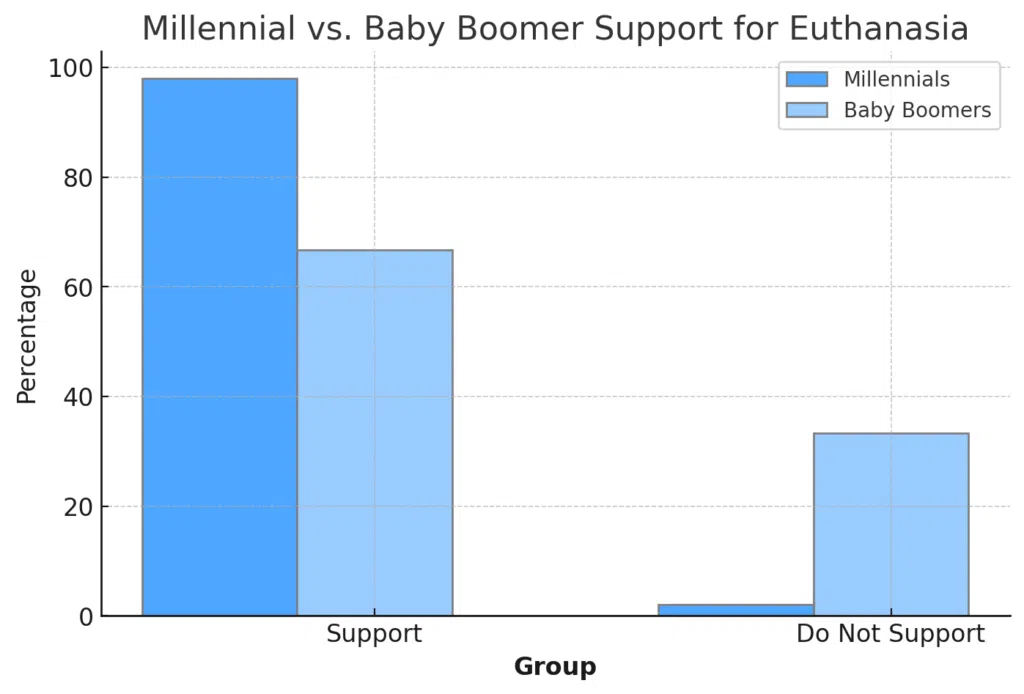Blog » Becoming a Coach » 8 in 10 Endorse Euthanasia for Severe Depression – New Survey Sparks Debate
8 in 10 Endorse Euthanasia for Severe Depression – New Survey Sparks Debate
In an age where mental health awareness is increasingly prominent, the debate surrounding euthanasia and its application to individuals with depression has gained significant attention.
A recent survey conducted by our team ast Coach Foundation, involving people from various age groups.

Delves into public opinion on this sensitive issue, revealing a stark generational divide in attitudes towards euthanasia for those suffering from depression.
Survey Overview
The study aimed to gauge the opinions of different generations, particularly focusing on millennials and baby boomers, regarding the right to euthanasia for people with depression.
Key Findings
- Overall Support for Euthanasia in Depression: About 83.4% of participants, which translates to approximately 834 individuals out of 1000 surveyed, believe that people with depression should have the right to euthanasia.
- Millennials Show Overwhelming Support: A striking 98% of the 500 millennials surveyed support this view, amounting to around 490 individuals.
- Significant Support Among Baby Boomers: The survey also indicates considerable support from older generations, with 66.7% (or about 334) of baby boomers affirming the right to euthanasia for those with depression.
Should the Mentally Ill Have the Right to Die?
“Should the Mentally Ill Have the Right to Die?” is a question that probes the depths of ethical, moral, and human complexities. It’s a debate that resides at the heart of our understanding of dignity, compassion, and the value of life.
The Case for the Right to Die
On one side of the debate, advocates for the right to die argue that individuals suffering from severe, chronic mental illnesses should have the same autonomy over their end-of-life decisions as those with terminal physical conditions. They emphasize the importance of dignity in death, arguing that forcing individuals to endure unrelenting mental anguish is a violation of their human rights. This perspective is often grounded in the belief that mental illnesses, such as severe depression, can be as debilitating and incurable as some physical ailments, making a dignified exit a compassionate choice.
Advocates also argue that the right to die with dignity could potentially lead to more open discussions about mental health, reducing stigma and encouraging individuals to seek help earlier in their illness. It’s seen as an extension of patient autonomy, a fundamental principle in modern healthcare.
The Case Against the Right to Die
Conversely, opponents of this right raise significant concerns. They argue that due to the nature of mental illness, which can impair judgment and decision-making abilities, it’s challenging to ascertain whether an individual’s desire to die is a symptom of their condition or a well-considered decision. This perspective emphasizes the unpredictable nature of mental illnesses, wherein the potential for recovery or improvement of the condition always exists, albeit sometimes slim.
There’s also a fear that normalizing euthanasia for mental health conditions could lead to a slippery slope, where the value of life is diminished, and vulnerable individuals might be pressured into choosing death. Furthermore, opponents argue that society should focus on improving mental health care and support systems, providing hope and treatment options for those suffering, rather than offering death as a solution.
What the Survey Points
The recent survey reveals a compelling picture of societal attitudes towards euthanasia in the context of mental health, particularly depression. The data highlights a broad spectrum of opinions, underlining significant generational differences and evolving societal perspectives.
Overall Support for Euthanasia in Depression
The survey indicates that a substantial majority, 83.4% of participants, believe that individuals suffering from depression should have the right to euthanasia. This translates to about 834 individuals out of the 1000 surveyed. This high percentage underscores a growing societal acknowledgment of depression as a severe health issue, warranting the same considerations for end-of-life decisions as physical illnesses.

Millennials Show Overwhelming Support
Among millennials, the support is remarkably high, with 98% — approximately 490 out of 500 surveyed individuals in this age group — endorsing euthanasia rights for those with depression. This overwhelming support among younger individuals reflects a generational shift towards more progressive views on mental health and personal autonomy. Millennials, having grown up in a more open discourse about mental health, appear to have a heightened sensitivity and acceptance towards these issues.
Significant Support Among Baby Boomers
The survey also reveals considerable support from older generations, with 66.7% — about 334 out of 500 baby boomers surveyed — affirming the right to euthanasia for those with depression. While this support is less than that seen in millennials, it still represents a significant portion of the older generation, suggesting a broader change in societal attitudes towards mental health and end-of-life care.

Generational Differences in Perception
The stark contrast in support levels between millennials and baby boomers highlights the evolving societal attitudes towards mental health and end-of-life decisions. This generational divide may stem from different levels of awareness, societal norms, and experiences with mental health discourse. While millennials may have a more liberal approach due to growing up in an era of mental health awareness, baby boomers’ perspectives are likely shaped by the more conservative views prevalent during their formative years.
Societal Attitudes Towards Depression
The high level of overall support across generations points to a shift in societal understanding of depression. It is increasingly being recognized as a serious and potentially debilitating condition, deserving of the same dignity and autonomy in end-of-life decisions as physical health conditions. This shift also reflects a growing respect for the rights and autonomy of individuals suffering from mental health issues.
conclusion
The findings of this survey highlight a critical and evolving perspective on the intersection of mental health, patient rights, and end-of-life care. While there is significant support across age groups for the right to euthanasia for those suffering from depression, the generational divide underscores the need for continued dialogue and ethical consideration in shaping policies and public opinion on this matter.
Methodology
1000 people from first world countries were surveyed to obtain a comprehensive overview of generational attitudes towards euthanasia for people with depression.

ABOUT SAI BLACKBYRN
I’m Sai Blackbyrn, better known as “The Coach’s Mentor.” I help Coaches like you establish their business online. My system is simple: close more clients at higher fees. You can take advantage of technology, and use it as a catalyst to grow your coaching business in a matter of weeks; not months, not years. It’s easier than you think.
AS SEEN ON
0 Comment